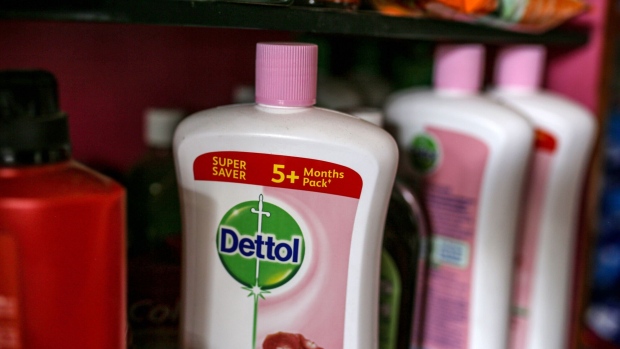Feb 28, 2024
Reckitt Lowers Outlook as Sales Fall Amid Easing Inflation
, Bloomberg News

(Bloomberg) -- Reckitt Benckiser Plc is expecting more modest growth this year after sales fell and its price rises slowed following a period of historic inflation.
Like-for-like sales fell 1.2% in the fourth quarter, the consumer goods company said Wednesday, missing an expected rise of 1.8% forecast by a Bloomberg-compiled consensus.
Shares of Reckitt fell as much as 12% in London, their biggest decline since 2008.
Reckitt is feeling the effects of easing demand for infant formula in the US, a weaker cold and flu medicines market and falling prices.
After a period of high inflation, stabilizing prices, which were the primary driver of revenue gains for most consumer goods companies, are hitting sales forecasts. But unlike some European rivals whose sale volumes are recovering, Reckitt is also seeing continued weakness in the volume of products sold.
The maker of Nurofen expects sales to grow between 2% and 4% in the current fiscal year, which is both lower than the range it targeted in 2023 and its goal of mid-single digit like-for-like revenue growth in the medium term.
Reckitt said it’s aiming for mid-single-digit growth in its health and hygiene units in 2024, with nutrition, which makes Enfamil formula, only returning to growth late in the year.
“Reckitt can’t be blamed for the turbulence in its categories, but trying to filter out those impacts, we can’t help but see steady volume declines in Hygiene and Nutrition,” Bernstein analyst Bruno Monteyne wrote in a note. “That grates with their repeated mantra of being a sustainably mid-single-digit organic growth company.”
Last week, Nestle’s outlook also disappointed investors even though it had recorded some slight volume growth. The maker of Maggi stock cubes said it was trying to encourage shoppers to buy more branded goods again by easing off on price increases as inflation slowed from levels that pushed many consumers to buy cheaper private labels. Unilever Plc said it’s also aiming to regain the market share it lost in recent quarters.
Read More: Nestle, Danone Try to Win Back Shoppers as Inflation Eases
Demand for health-related products tends to be more robust in a cost-of-living crisis because people go for brands they trust when they are unwell. But Reckitt struggled even in its health business with volumes falling 0.3% last year. New products like a Lysol air sanitizer failed to stem declines in the hygiene unit, too.
The company took another writedown, this time of £810 million ($1 billion), on its infant nutrition business which it said was tied to higher interest rates and tighter safety regulation in the US. Reckitt also said a group of employees in the Middle East had understated the company’s trade spending, meaning net revenue in the region was £55 million lower than previously expected.
Chief Executive Officer Kris Licht started in his new role in October, implementing a strategy to boost investment and increase operating profit faster than sales.
Licht said in Wednesday’s results release that Reckitt’s performance was “unsatisfactory” in the fourth quarter but that the company is fully focused on his turnaround plan.
“This is not a great update. A miss on volumes and organic sales growth in the fourth quarter and a precarious sales outlook will likely see retracement of the recent rerating,” Jeffries analyst David Hayes wrote in a note.
(Updates shares in third paragraph, adds chart after eighth.)
©2024 Bloomberg L.P.


